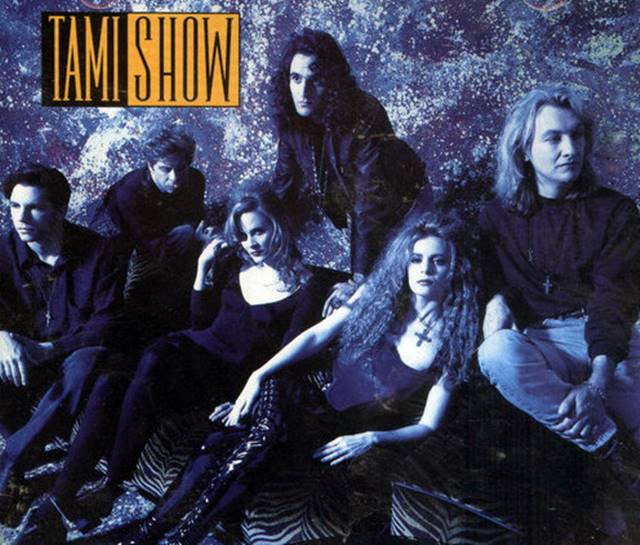
By Jae-Ha Kim
Chicago Sun-Times
October 21, 1988
Few bands make it on the strength of their songs alone. Promotion and lots of hair spray have catapulted more than one act into the Top 10. Chicago’s TAMI Show wants to make it the old-fashioned way – working its way to the top.
“None of us in the band are ingenues and we don’t have idealistic dreams about the music business,” guitarist Tommy Gawenda said in an interview at a north suburban restaurant. “We’ve all been around and have been through hard knocks. We can wait for our time to come.”
Like the 1960s TV music show they named themselves after, TAMI Show is intent on becoming a household name. This means endless touring. Though venturing to various cities, the quartet concentrates on the Chicago area.
They will perform at P. J. Flaherty’s, 2531 W. 95th St., Evergreen Park (423-3046), at 10 p.m. tomorrow. Cover charge is $4.
“When we were first starting out, people asked us why we didn’t have an image,” singer Cathy Massey said. “All I could tell them was that we weren’t into music because we wanted to get our faces on the cover of magazines. Music means more to us than that.”
While TAMI Show didn’t play its first live show until two years ago, the foundation for the group was laid down in 1982. Gawenda, a guitar hero who won praise for his work in Pezband and USSA, heard Cathy and her sister Claire perform with their band, Sirenz. Impressed by the sisters’ haunting harmonies and striking stage presence, he approached the women after their set about getting a band together.
With the addition of a bass player and drummer, who have since departed the band, the fledgling group practiced in Gawenda’s basement. Though they believed they had a good sound, they decided they needed seasoning before they took their act on the road.
In 1985, Mark Jiaras, bass player for the Way Moves, joined them.
“I had known Mark and backed up Cathy and Claire a long time ago, so I was familiar with them and trusted their integrity,” Jiaras said. “When we played, I felt real comfortable. Everything just felt right. So they got themselves a bass player.”
The TAMI Show opened for Charlie Sexton on his tour in 1986, but most people outside of the Midwest weren’t aware of the band. Gawenda said he assumed the he and the band would have to plug along for a couple of years before landing a recording contract. His game plan was expedited when former Blondie bassist Nigel Harrison heard one of their tapes at a club and inquired about them.
Harrison, who was in Chicago working as musical consultant on Michael J. Fox’s film “Light Of Day,” arranged for them to meet with a representative of Chrysalis Records.
“TAMI Show sounded so professional I thought they had already been signed,” Harrison said in a phone interview. “When I found out they weren’t, I couldn’t believe it. I called up Chrysalis and told them they had to hear this band.
“I think what first attracted me to them was a special quality that made me want to find out more about them,” he said. “Talent always surfaces to the top of the pile. They had a sweetness to them that was very reminiscent of the pop bands of the 1960s, but they were very 1980s at the same time. The fact that they had two great-looking women fronting the band was a bonus.”
TAMI Show recorded the album with producer Mike Chapman (Blondie, the Knack) in Los Angeles.
“For a while, friends were wondering if we’d ever have an album out,” added singer Claire Massey. “But I’m glad we didn’t get a contract really early in our career because I don’t think we would have been ready.”
The group is enjoying more success than ever, but band members say they aren’t filled with unrealistic expectations.
“Right now, we’re not in the same league as any of the big stars,” Jiaras said. “We’re not going to fool ourselves into thinking that it will happen to us, too. There are many, many talented groups who never went anywhere because of bad timing and marketing. A lot more is involved than making good records.”